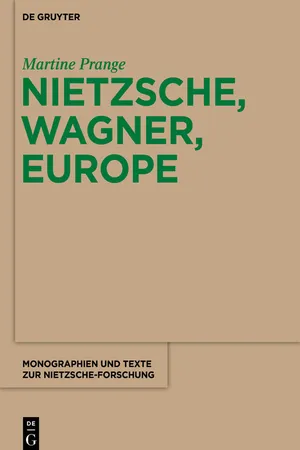Nietzsche, Wagner, Europe
About this book
Friedrich Nietzsche (1844-1900) supported the unification of Europe and reflected on this like few other philosophers before or after him. Many of his works are concerned with the present state and future of European culture and humanity. Resisting the "nationalist nonsense" and "politics of dissolution" of his day, he advocated the birth of "good Europeans," i.e. "supra-national" individuals and the "amalgamation of nations."
Nietzsche, Wagner, Europe analyzes the development of Friedrich Nietzsche's ideal of European culture based on his musical aesthetics. It does so against the background of contemporary searches for a wider, cultural meaning beyond Europe's economic-political union. The book claims that Nietzsche always propagated the "aestheticization" of Europe, but that his view on how to achieve this changed as a result of his dramatically altering philosophy of music. The main focus is on Nietzsche's passion for and later aversion to Wagner's music, and, in direct connection with this, his surprising embrace of Italian operas as new forms of "Dionysian" music and of Goethe as a model of "Good Europeanism."
Frequently asked questions
- Essential is ideal for learners and professionals who enjoy exploring a wide range of subjects. Access the Essential Library with 800,000+ trusted titles and best-sellers across business, personal growth, and the humanities. Includes unlimited reading time and Standard Read Aloud voice.
- Complete: Perfect for advanced learners and researchers needing full, unrestricted access. Unlock 1.4M+ books across hundreds of subjects, including academic and specialized titles. The Complete Plan also includes advanced features like Premium Read Aloud and Research Assistant.
Please note we cannot support devices running on iOS 13 and Android 7 or earlier. Learn more about using the app.
Information
Table of contents
- Abbreviations and translations
- General introduction
- Part I Aestheticization: Germany as saviour of Europe
- Part II Dynamic interculturalism: De-Germanization and the ‘Good European’
- Epilogue
- Bibliography
- Index
